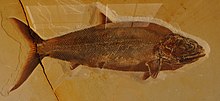|
Amiiformes adalah sebuah ordo ikan yang hanya terdiri dari dua spesies hidup, keduanya pada genus Amiaː Amia calva (ikan sirip lengkung, bowfin) dan Amia ocellicauda. A. ocellicauda baru dianggap sebagai spesiesnya sendiri pada 2022.[2] Amiiformes dapat ditemukan pada sistem-sistem air tawar di Amerika Utara, terkhususnya pada Amerika Serikat dan beberapa bagian di Kanada selatan. Ordo ini pertama kali muncul pada periode Trias, dan anggota-anggotanya yang sudah punah mencakup ikan air tawar dan laut, kebanyakan dari mereka berbeda secara morfologi dari bowfin moderen, seperti Caturidae.
Berikut di bawah adalah sebuah kladogram yang meringkas hubungan evolusioner antara Halecomorphi punah dan hidup, bersamaan dengan neopterygii lainnya.[3]
Taksonomi
Referensi
- ^ "Amiiformes". Paleobiology Database. Diakses tanggal November 15, 2012.
- ^ Wright; et al. (3 October 2022). "Phylogenomic analysis of the bowfin (Amia calva) reveals unrecognized species diversity in a living fossil lineage". Scientific Reports. 12 (1): 16514. Bibcode:2022NatSR..1216514W. doi:10.1038/s41598-022-20875-4. PMC 9529906
 . PMID 36192509 . . PMID 36192509 .
- ^ Sun, Zuoyu; Tintori, Andrea; Xu, Yaozhong; Lombardo, Cristina; Ni, Peigang; Jiang, Dayoung (April 2017). "A new non-parasemionotiform order of the Halecomorphi (Neopterygii, Actinopterygii) from the Middle Triassic of Tethys". Journal of Systematic Palaeontology. 15 (3): 223–240. doi:10.1080/14772019.2016.1181679.
- ^ Haaramo, Mikko (2007). "Amiiformes – bowfin and relatives". Mikko's Phylogeny Archive. Diakses tanggal 30 December 2016.
- ^ Nelson, Joseph S.; Grande, Terry C.; Wilson, Mark V. H. (2016). Fishes of the World (edisi ke-5th). John Wiley & Sons. ISBN 9781118342336.
- ^ van der Laan, Richard (2016). "Family-group names of fossil fishes".
- ^ a b c Tan, K.; Jin, F. (2013). "Re-study on Gymnoichthys inopinatus from Middle Triassic of Luoping, Yunnan, China". Vertebrata PalAsiatica. 51 (1): 1–16.
- ^ Arratia, G.; Schultze, H.-P. (2007). "Eurycormus – Eurypoma, two Jurassic actinopterygian genera with mixed identity". Fossil Record. 10 (1): 17–37. doi:10.1002/mmng.200600016
 . .
- ^ López-Arbarello, A.; Ebert, M. (2023). "Taxonomic status of the caturid genera (Halecomorphi, Caturidae) and their Late Jurassic species". Royal Society Open Science. 10 (1): 221318. Bibcode:2023RSOS...1021318L. doi:10.1098/rsos.221318. PMC 9832298
 . PMID 36686548 . . PMID 36686548 .
- ^ Gouiric-Cavalli, S. (2016). "A new Late Jurassic halecomorph fish from the marine Vaca Muerta Formation, Argentina, southwestern Gondwana". Fossil Record. 19 (2): 119–129. doi:10.5194/fr-19-119-2016
 . .
- ^ Forey, P. L.; Patterson, C. (2006). "Description and systematic relationships of † Tomognathus , an enigmatic fish from the English Chalk". Journal of Systematic Palaeontology. 4 (2): 157–184. doi:10.1017/S1477201905001719.
- ^ Cavin, L.; Suteethorn, V.; Buffetaut, E.; Claude, J.; Cuny, G.; Le Loeuff, J.; Tong, H. (2007). "The first sinamiid fish (Holostei: Halecomorpha) from Southeast Asia (Early Cretaceous of Thailand)". Journal of Vertebrate Paleontology. 27 (4): 827–837. doi:10.1671/0272-4634(2007)27[827:TFSFHH]2.0.CO;2.
|





